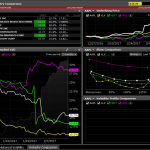Don’t “Track” Your Investments!
Many of my clients ask me how they should track their investments. I also see similar questions on some blogs or Facebook groups as well. I even used to “track” my investments as well, but this was a long time ago.
Most of these clients are, in general, new to a regular and consistent savings plan. They’re excited to see what happens to their money and how it can grow. Some of my clients have pretty impressive spreadsheets with excellent data capture points, year-by-year totals, percentage allocations, colorful bar charts, and graphs. They want to “see how they are doing.”
This is troubling. What is the point of tracking your investments? What are you hoping to learn? What are going to compare your investments to? Is there another plan you are evaluating in parallel and may switch to if your investments aren’t “doing well”? Or will you stop saving, at least for a bit, if your investments aren’t doing well? Gosh, I hope not.
When you have decided on a long-term strategy using a passive approach with index funds or similar ETFs, there is no need to track how your investments are doing. It’s an unnecessary distraction that can lead to bad habits and bad decisions. You are going to get market returns less the small fees you pay based upon your asset allocation. You already have your plan. What is there to track?
My suggestion is not to track your investments. I suppose it is worthwhile to track all of your deposits and ensure they are accounted for in your investment or brokerage account. But beyond that, I don’t think you should. As I mentioned, I did it for about four or five years but realized it didn’t accomplish much. Another five years later I simply moved all of my investments to a Vanguard Target Date Fund.
But do you still have the urge to track something? Don’t track how your investments are doing or what they are earning—track what you are saving! That’s it. You can do this with a very simple spreadsheet. Send in your money and make a note of it. For virtually all of us, until you transition to retirement or financial independence or whatever you want to call it, this is what matters.
Maybe you select a savings goal for three months, six months, or twelve months. Or maybe you select to save a certain percentage of your income. How about 3% initially. Too low? Then try and get it to 10%. Then 15% or 20%. Imagine getting to 30% of your income. In my experience, what you save is far more important to your long-term success than what you are earning at any given point in time, so tracking your saving is smarter than tracking your investment performance.
In doing this, how about you don’t even look at how your investments are doing? Do you have the guts to do this? In the short to mid run, if you have a good strategy and believe in what you are doing, then how your investments are doing now simply doesn’t matter.
This can be hard to accept and even harder to do. The idea of letting it all go and not tracking your investments can seem preposterous and irresponsible. On the contrary, I think it is savvy.




